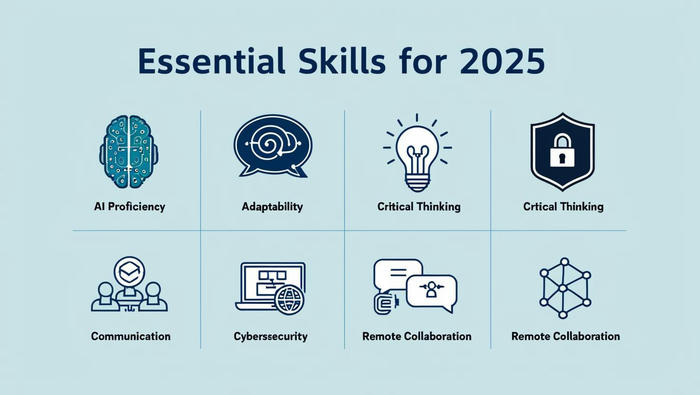Top Skills for the 21st Century: What Employers Are Looking for in 2025
As the world hurtles toward 2025, the workplace landscape is undergoing rapid transformations. Thanks to advancements in technology, globalization, and shifting societal trends, the skills that employers value are also evolving. The skills required today are no longer limited to basic technical knowledge or traditional expertise in a specific field. To stay competitive, employees need to embrace a combination of soft skills, technical proficiency, and adaptability to thrive in this dynamic environment.

In this article, we’ll take a look at the top skills that will be in high demand by employers in 2025, drawing insights from experts and data from credible sources to ensure you’re well-prepared for the future job market.
1. Digital Literacy and Technological Proficiency
We are living in the digital age, and this trend will only continue to accelerate. The skills needed to succeed in the workplace will increasingly revolve around digital literacy. According to a 2023 report by World Economic Forum, more than 70% of jobs will require digital skills in the near future. The rise of artificial intelligence (AI), data analytics, and automation means that employees must be comfortable with technology, from basic computer skills to more advanced competencies like coding, cybersecurity, and machine learning.
But it’s not just about knowing how to use software—employees must understand how these tools work and how they can optimize processes and solve problems using them. Understanding AI, data interpretation, and cloud computing will no longer be a niche skill set but a core requirement in virtually all industries.
2. Critical Thinking and Problem-Solving
As technology continues to take over repetitive tasks, the human workforce must become more focused on creativity and problem-solving. Employers will place high value on employees who can think critically, analyze complex problems, and generate innovative solutions.
A study by McKinsey & Company revealed that over 60% of employers believe critical thinking is a top priority when hiring. In an age where technology handles data and computation, employees will need to go beyond simple answers and develop strategies to address complex, multifaceted issues. Problem-solving will become a core skill for anyone working in management, consulting, engineering, or any creative field.
3. Emotional Intelligence (EQ)
While technical skills are crucial, emotional intelligence (EQ) will remain one of the most in-demand soft skills. EQ refers to the ability to recognize, understand, and manage one’s own emotions, as well as the emotions of others. It also includes the ability to handle relationships empathetically and constructively.
As workplaces become more diverse and collaborative, emotional intelligence will be essential for building strong, productive relationships with colleagues, customers, and clients. In fact, Harvard Business Review reported that employees with high EQ are more likely to be successful in leadership roles and teams, as they can navigate complex interpersonal dynamics effectively.
In 2025, employers will be looking for candidates who can communicate well, understand team dynamics, and handle conflict with empathy and resilience. The ability to remain calm under pressure, show empathy toward coworkers, and build strong team morale will be vital skills that set individuals apart.
4. Adaptability and Lifelong Learning
The only constant in today’s job market is change. From new technologies to shifts in global economies and industries, staying adaptable is key to maintaining long-term career success. According to LinkedIn’s 2023 Workforce Learning Report, 90% of talent development professionals say that adaptability is a critical skill for future success.
Employees who can quickly adapt to new tools, systems, or business models will be highly valued by employers. In addition, with the constant evolution of the workforce, lifelong learning has become essential. The need for continual upskilling will grow as industries evolve. Employees who embrace learning, whether through online courses, workshops, or self-directed study, will be in a stronger position to thrive in an ever-changing workplace.
Employers will look for candidates who have demonstrated their ability to pivot quickly, embrace new technologies, and remain open to learning and growth. Those who are proactive about developing their skills will stand out, especially as industries such as tech, healthcare, and finance continue to innovate rapidly.
5. Collaboration and Teamwork
The importance of collaboration and teamwork is unlikely to diminish in the near future. Although remote work has become more common, especially during the pandemic, the ability to work effectively within diverse teams is still a crucial skill. According to a Gallup survey, 86% of employees and executives believe that lack of collaboration and poor communication are the main causes of workplace failures.
As global teams become more common, the ability to communicate and collaborate with colleagues from different cultures, backgrounds, and geographical locations will be essential. Employers will seek individuals who can work collaboratively, share ideas, and contribute to group projects while respecting diverse perspectives.
6. Creativity and Innovation
Automation and artificial intelligence might be able to carry out repetitive tasks, but creativity is one area where humans will always have the edge. Whether in marketing, design, product development, or problem-solving, creativity is critical for driving innovation. A 2021 IBM survey found that 64% of CEOs believed that creativity was the most important leadership quality.
As we move into 2025, employers will be looking for individuals who can think outside the box and develop creative solutions to everyday challenges. Whether it’s designing new products, marketing strategies, or finding ways to improve operational processes, the ability to innovate and generate new ideas will remain highly valuable.
7. Data Analysis and Decision Making
The ability to interpret data and make informed decisions will be another critical skill in 2025. With the rise of big data and business intelligence tools, employers will demand professionals who can sift through vast amounts of information and extract actionable insights. A 2023 Gartner report indicated that 69% of businesses have already implemented some form of data analytics to improve decision-making and streamline operations.
Employees with the ability to analyze data, recognize patterns, and make strategic decisions will be highly sought after. Whether in finance, marketing, healthcare, or tech, the ability to make data-driven decisions will be a key factor in career advancement.
8. Cultural Competency and Global Awareness
As globalization continues, understanding and respecting cultural differences will become a valuable skill in the workplace. Cultural competency refers to the ability to interact effectively with people from different cultures and backgrounds. This skill is particularly crucial in multinational companies, where employees and customers may come from diverse geographic and cultural backgrounds.
According to the World Economic Forum, cultural intelligence will be essential for leadership roles in the coming years. Employers will look for candidates who can navigate multicultural environments, respect diversity, and work effectively in global teams.

Conclusion
The world of work is evolving rapidly, and the skills required for success in 2025 are already taking shape. While technical knowledge will remain important, it is the combination of soft skills, adaptability, and continuous learning that will set top candidates apart. Employees who master digital literacy, critical thinking, emotional intelligence, and teamwork, while also embracing innovation and cultural competence, will be well-positioned to succeed.
As industries continue to evolve and the job market grows more competitive, the key to thriving in the 21st century is a balanced skill set—one that blends traditional expertise with the ability to adapt and innovate in an ever-changing environment. So, gear up for the future by honing these skills and positioning yourself as an invaluable asset in the workforce of tomorrow.
